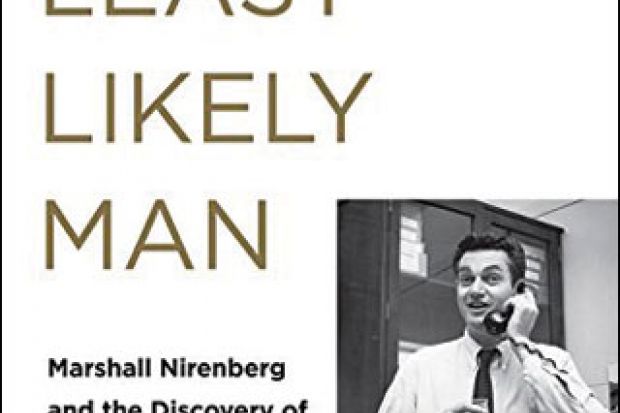Marshall Warren Nirenberg is the most famous person you have never heard of.” So begins the story of the American who discovered the genetic code. You’ve heard of James Watson and Francis Crick, who discovered the structure of DNA and revolutionised the way in which we think about life, religion, the universe and everything. They earned themselves the Nobel Prize in Physiology or Medicine in 1962. Nirenberg himself was to win the “big one” in 1968 for the second most important discovery in biology, the elucidation of the genetic code. How he did it, what type of man he was, and how he rose from humble beginnings to crack the code against some seriously heavy competition, is the subject of this book by one of Nirenberg’s former students.
Franklin Portugal draws on Nirenberg’s notes, in which the scientist jotted down his thoughts, ideas and insecurities during his quest for this holy grail. We are given a vision of a brilliant experimentalist who demanded absolute scientific rigour from his students and himself. Lest you imagine Nirenberg was a self-serving, prima donna, pain-in-the-neck kind of guy, he was anything but. Portugal paints a picture of a man who was warm, generous and self-effacing to a fault. In his early thirties, and just out of graduate school, he found himself at a National Institutes of Health government research institution, working (in his own time) on how the four-letter molecular alphabet of DNA and mRNA encoded proteins. Using his undergraduate experience in radioisotope labelling, he cleverly worked out how the sequence of letters in mRNA could generate an amino acid, the protein’s building block.
On announcing his initial discovery at an international meeting in Moscow in 1961, hardly anyone turned up to hear him, so Crick asked for a repeat performance and ensured that there was a decent-sized audience. Nirenberg became a star overnight, but as he’d only deciphered one out of the 64 possible codes, there was plenty more work to do. His institution marshalled (excuse the pun) the resources of the NIH to underwrite this effort, beating off considerable competition, and within five years all 64 codes had been deduced – it was NIH’s finest hour. For this, Nirenberg shared the Nobel in 1968 with Har Gobind Khorana and Robert Holley, who had independently performed supportive studies.
Portugal takes us into the life of Nirenberg, first as a sickly child in New York before moving to a dairy farm in Orlando, Florida, through an undistinguished career in secondary and further education in Gainesville and then Wisconsin. Even when he started working at NIH on cancer (while moonlighting on the genetic code), his senior colleagues initially did not rate him – hence the title of this book. Yet when his enlightened mentor freed him from the shackles of his day job and made him an independent investigator, his genius was uncovered.
Portugal’s portrait of Nirenberg may be painted through rose-tinted glasses – understandably so – but I was still completely swept away by his account of Nirenberg’s personality. He could be both vulnerable and obsessive, but he was a man who never lost his moral compass, even at the height of the intense competition to crack the code. I could not put this book down. It is a little uneven at times, jumping backwards and forwards between years within a few pages, but I was left wishing I had met this brilliant and generous man.
The Least Likely Man: Marshall Nirenberg and the Discovery of the Genetic Code
By Franklin H. Portugal
MIT Press, 200pp, £19.95
ISBN 9780262028479 and 62323529 (e-book)
Published 2 April 2015
Register to continue
Why register?
- Registration is free and only takes a moment
- Once registered, you can read 3 articles a month
- Sign up for our newsletter
Subscribe
Or subscribe for unlimited access to:
- Unlimited access to news, views, insights & reviews
- Digital editions
- Digital access to THE’s university and college rankings analysis
Already registered or a current subscriber? Login





